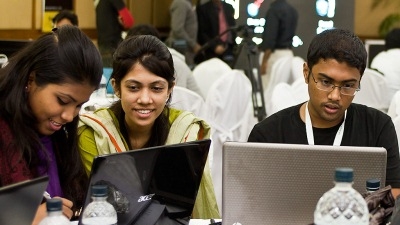In dozens of cities across the world on Dec. 1 and 2, more than 1,000 hackers participated in the Sanitation Hackathon, aimed at addressing the 2.5 billion people who lack access to sanitation. Hackers showed up in full force, forgoing sleep, to help find technology solutions to sanitation challenges. The issue is particularly urgent in South Asia, where 500,000 children die each year from diarrheal diseases and poor sanitation contributes to the region’s acute malnutrition. Poor sanitation also costs Bangladesh, India, and Pakistan combined more than $50 billion each year.
Ahead of the event, sanitation experts submitted problem statements, ranging from open defecation to waste management control to rating public toilets. As more people have access to a mobile phone than to a toilet, opportunities exist to leverage technology to connect with rural communities, gather data on behaviors, transmit knowledge, and provide incentives. And while South Asia’s participation speaks to the urgency of the problem in the region, it also highlights the enormous pool of technology talent, the strong government commitment, and an engaged youth community.
Tapping the IT Network
In India, the Sanitation Hackathon was hosted at the Pune campus of Infosys, a global IT leader. IT professionals worked through the weekend to create 18 innovative solutions.
"One in every 10 deaths in India is due to poor sanitation. That means 768,000 deaths in India every year,” said Onno Ruhl, World Bank country director for India. “I hope that the Sanitation Hackathon brings sanitation challenges from experts to the fore, and will yield the solutions from India's vibrant tech community. It would be especially good if these solutions would improve accountability and give a voice to poor people."
And the teams did just that. Team TernUp emerged as the winner of this year’s India Hackathon for their innovative applications on tracking toilet usage and detecting clogged pipes. In addition to the incubation period for the winning teams from Hatch, an IT incubator, the Infosys Foundation offered to review all of the ideas developed during the event, including getting feedback from experts in the field of sanitation, to help improve and further develop their solutions.

